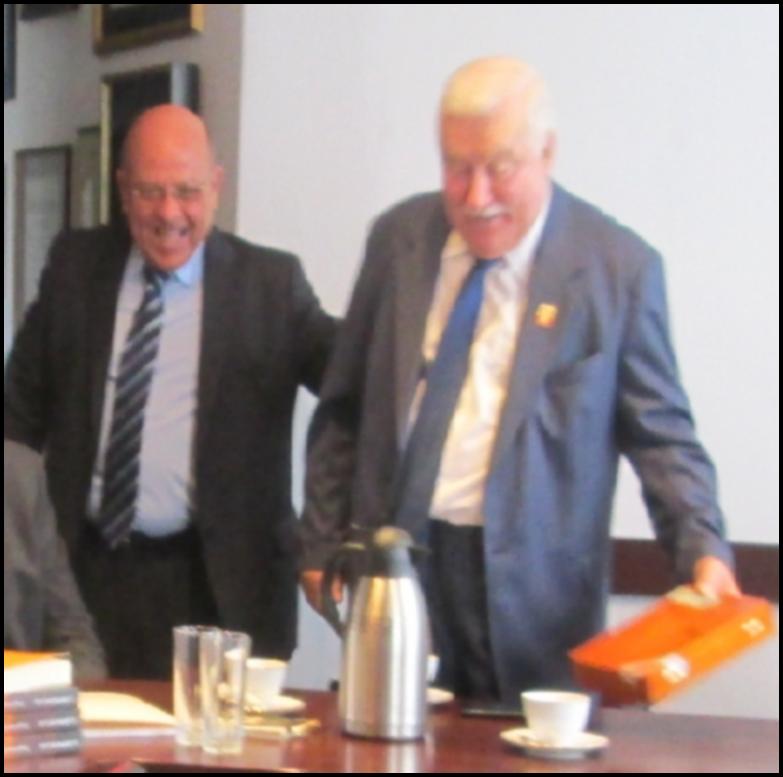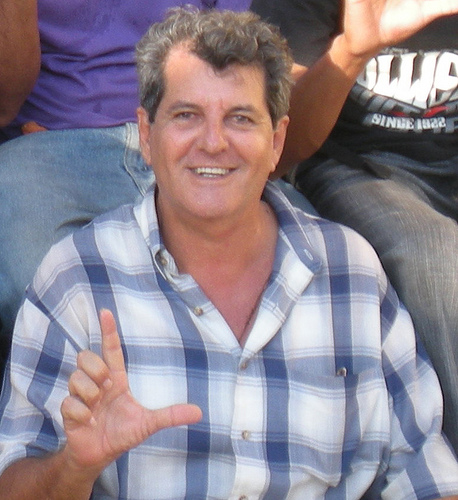AFTER THE VISIT OF THE POPE TO CUBA, WHAT?
“You are and must be the sovereigns of your own personal and national history.” (John Paul II, Cuba 1998)
The two visits of the Popes of the Catholic Church, are milestones that show the step forward of Cuban civil society. Cuba has changed, not only and not always for the worse. Our opinion is that between the two apostolic visits there is a process that progresses from awakening of many in the Cuban civil society toward adulthood citizenship, still in development.
Fourteen years are sufficient to feel the difference in the composition of Cuban society and the interrelation of forces between the different social actors. The Cuban State has gained the least lasting thing. The Church has gained, short-term, part of what is proper for her.But the rest of the Cuban civil society is the one that has won: yes, lost because there is some frustration due to the handling of state movements and gestures of the visit; but wins because it not to be recognized as a partner, allows you to advance in the awakening citizen, without waiting for foreign saviours. And this is what most lasts, mature and is beneficial to the nation, in the mid and long term. Although it hurts.
More than complaints without remedy, we intend to analyze other aspects of this visit from four of its multiple facets: Cuba in the showcase; Gestures of the Pope to Cuba; Messages of the Pope to Cuba; and legacy of his visit.
Cuba in the showcase
The country the Pope visits is placed in the centre of the attention of all social media, which is always positive. To achieve such transparency, the world has an extraordinary opportunity to experience firsthand the reality facing the Cuban people, the relationships of domination that the authorities have established with their own citizens, as well as the different methods that the Government uses, the opposition, and the rest of the Cuban civil society. To know what happens really, even for a few days, is a sample button which always leaves fruits of truthfulness on the nation observed.
The gestures of the Pope
The successor of St. Peter, on the one hand has made gestures of much closeness and admiration for Cuba, its cultural and religious heritage, by its founding fathers mentioned several times, among others. One of these symbolic positive gestures was to raise the devotion to the Virgin de la Caridad del Cobre, the most eminent range of expression of universal Catholic piety, presenting her with the Golden Rose. Another gesture was the possibility for people of the diaspora and exile, members of the only Cuban nation, to participate in the celebrations. However, the organizers of the papal visit, could not find time for, not only for a courtesy visit to the head of State – absolutely normal and noticeable in all the countries that the Pope visits – but also for other encounters with people who no longer hold any public office. This could be understood by its symbolic nature, although not necessary, if at the same time, the Pope had greeted briefly some representatives of the Cuban civil society: the other part of the nation without which there would be neither unity nor inclusion nor national reconciliation. The Cuban Church, that will be as the servant in the morning that the same Pope gives a preview of in his messages, perhaps regrets, in time, thisexclusionaryomission, that looks more to the short term than to the medium and long journey of Cuba in relation to the people and excluded groups who must necessarily be part of the morning in our country. The Church, expert in humanity and with its two thousand year experience, almost always looks further and highest taking in all the time to come. It was a pity that on this occasion it was not so as well. In this aspect it seems that the balance is negative. Hopefully that will be righted, in the daily life of the Church’s relations with the rest of civil society, the best way possible for all.
The message of the Pope and his legacy
We believe that in this aspect the balance sheet is, perhaps, the most positive, compared with the previous issues. For both the present and in the long perspective for the future. The messages from the Pope have pulled forward, have looked high and far. They have left a rich legacy, concrete and inclusive. I hope that no Cuban overlooks this theological legacy of height, maximum humanist depth, and especially of a great love for Cuba and to all Cubans without exclusion. May God who grants serenity to our spirits, no Cuban from here or from outside, obsessed by what the Pope himself called ’irremovable or unilateral positions’, allow us to study and apply these messages a deep ethical, civic and spiritual way.
Although in this number we publish entirely all the official texts that the Pope Benedict XVI pronounced in Cuba so that everyone could extract of them what seems best to him, over a few days, so as not to leave ourselves feeling despondent, we offer the first and immediate selection of these texts, to facilitate the study of the contribution that the Supreme Pontiff of the Catholic Church has suggested to us with great respect and all its moral authority. At the same time we have wanted to compare them with the expectations of many people in Cuba, some of them published in our Leading article 24 corresponding to January – February, 2012. That is the same Pontiff who speaks with our readership:
The Pope recognizes in his heart the suffering and the just aspirations of the Cuban people
“I carry in my heart the just aspirations and legitimate desires of all Cubans, wherever they are found, their sufferings and joys, concerns and desires more noble, and especially of young people and the elderly, adolescents and children, patients and workers, of prisoners and their families, as well as poor and needy.” (Greeting upon arriving at the Antonio Maceo airport)
Cuba is already looking to tomorrow, from the patrimony of the heritage of the homeland
“I’m convinced that Cuba, in this particularly important moment in its history, is looking ahead to tomorrow, and it strives to renew and widen its horizons…to what will cooperate this immense heritage of values…that have been shaping its most genuine identity, and that are sculpted on the work and life of many illustrious Fathers of the homeland such as the blessed Jose Olallo and Valdés, the Servant of God Félix Varela or the hero Jose Marti. ” (Greeting upon arrival at the Airport Antonio Maceo)
This message satisfies the expectations of many Cubans that we were outlining in number 8, of the Leading article 24: The opening to the world strengthens the cultural identity and the national sovereignty.
Shortcuts in search of the truth
Warning of the traps and recesses into which fall all seekers of truth, the Pope lists us some of them: “You will know the truth, and the truth shall set you free” (Jn 8,32). The truth is a longing of the human being, and find it always involves an exercise of genuine freedom. Many, however, prefer the shortcuts and try to avoid this task. Some, like Pontius Pilate, satirize the possibility of being able to know the truth (cf. Jn 18, 38), proclaiming the inability of a man to achieve it or denying that there is a truth for all. This attitude, as in the case of skepticism and relativism, produces a change in the heart, making them cold, hesitant, distant from each other and locked into themselves. People who wash their hands as the Roman Governor of the story and leave the water running, without making a commitment. On the other hand, there are others who interpret badly this search for the truth, leading them to irrationality and fanaticism, locking in ’the truth’ and trying to impose it on others. They are like those stubborn lawyers, see Jesus beaten and bloody, crying angry: “Crucify him!” (Cf. Jn. 19, 6)’. (Homily at the mass in the Plaza Cívica José Martí of Havana)
Even God respects and needs the supreme gift of freedom.
This message is, perhaps, the most far-reaching theological and humanistic, which could serve as a solid foundation for its anthropological, social, political or economic, and even religious consequences: ’God not only respects the human freedom, but seems to need it.” (Homily at Mass in the Plaza Antonio Maceo in Santiago de Cuba)
Propose, not impose, even in the face of rejection and the cross.
“Christianity, to highlight the values that underpin ethics, does not impose, but proposes that the invitation of Christ to know the truth that makes us free. The believer is called to offer it to his contemporaries… even before the grim harbinger of the rejection and the cross.” (Homily at the Mass at the Plaa Cívica José Martí of Havana)
If we want to achieve unity in diversity: look for a minimum of ethics that will bring us closer
“Every human being has to inquire into the truth and opt for it when he finds it, even at the risk of dealing with sacrifices. In addition, the truth about the man is an inescapable desire to achieve freedom, because in it we discovered the foundations of ethics with which everyone can confront, and containing clear and precise formulations on life and death, the duties and rights, marriage, the family and society, in short, on the inviolable dignity of the human being. This ethical heritage is what can bring to all cultures, peoples and religions, the authorities and the citizens, and citizens, believers in Christ with those who do not believe in him.” (Homily at the Mass in the Plaza Cívica José Martí of Havana)
This message matches the expectations of numerous compatriots, reflected in number 4, of our Leading article 24, on the contribution that the teachings of the Pope could give: The reconstruction of the fabric of the sovereign civil society. The search of ethics, with a common minimum denominator, which it includes to all in the national community of life, is and it can be the firmest foundation to reconstruct the relations between the citizens and the authorities, which must be to the service of the civil society and not the contrary.
That Cuba is the home of all, without exclusion of God or of men
“And the Word became flesh and dwelt among us” (Jn 1, 14). The expression “became flesh” points to the human reality more concrete and tangible. In Christ, God has entered into our history, made his dwelling among us, thereby fulfilling the intimate aspiration of human beings that the world is truly a home for man. On the other hand, when God is thrown out, the world becomes an inhospitable place for man…” (Homily at Mass in the Plaza Antonio Maceo in Santiago de Cuba). ’The Virgin Mary with the presence in theSanctuary del Cobre, from where she accompanies the journey of the Church in this Nation…gives courage to all Cubans so that, of the hand of Christ, they discover the genuine sense of solicitude and desire that lurk in the human heart and reach the force required to build a society of solidarity, in which no one will feel excluded… That no one is prevented from joining this exciting work by the limitation of their fundamental freedoms, or exempt from it because of neglect or lack of material resources. That situation is compounded when restrictive economic measures imposed from outside the country weigh negatively on the population.” (words of farewell in the José Martí Airport of Havana)
These teachings fulfill other expectations shared by many people and delineated in number 1, of the Leading article 24: La Caridad unites us. The unity is an inclusion. An enclosing and united society proposes to us that we not be blockaded from the outside and, much less, from within by apathy, repression or the disrespectful disregard of the diversity on the part of the same civil or ecclesiastic authorities. We cannot understand how the government can respect and feel affection for a thought, be it different or coincidental,of a foreign visitor as the Pope and fails to do the same for its own citizens, peaceful, independent and respectful of the laws of coexistence in the land where they were born.
Role of the Church in Cuba: show your true face without fear or complexes
“Dear Brothers, it was with much effort, courage and selflessness they are working each day so that, in the specific circumstances of his country, and in this time of history, the Church increasingly reflects its true face as the place where God is close to and found with men. The Church… has the mission to prolong on the ground, the saving presence of God, of opening up the world to something larger than itself, to the love and light of God. It is worth dedicating one’s whole life to Christ…the upcoming Passover, let us without fear or complex follow Jesus in his path toward the cross. We accept with patience and faith any adversity or affliction, with the conviction that, in his resurrection, he has defeated the power of evil that darkens everything, and the dawn that has made a new world, the world of God, the light, the truth and joy.” (Homily at Mass in the Plaza Antonio Maceo in Santiago de Cuba)
The expectation number 9, of our Leading article 24 was hoping for a message from the Pope that should exhort us to: The transition of fear to hope and from the hope to the reconstruction of the Country. These teachings from the Square Antonio Maceo confirm and satisfy many who want to let go of fear and open a world where they can breathe more freely. At the same time it is an exhortation so that the Cuban Church is faithful to Jesus Christ, reflects his real face and is not afraid of the cross of the Lord. Collaboration and trust can not exist at any cost. One can not stop being something of the essence of what one is, so as not to run against those who are different.Society and the Church can not exclude part of their message, or part of the people who comprise them, for being different, to thereby achieve complacency or dialogue, to trust or cooperate with the other part of that society and the Church. Trust and collaboration are with all parties or they are not a collaboration nor a credible trust. What is at stake is the authenticity and credibility of all parties.
True religious freedom includes the social and political performance of believers
”The essential contribution that religion is called to play in the public sphere of society.’ (Greetings to arriving at the Antonio Maceo airport).’The right to freedom of religion, both in its individual dimension and as a community expresses the unity of the human person, who is both citizen and believer. It also legitimizes believers to offer a contribution to the building of society. Its strengthening consolidates the coexistence, feeds the hope in a better world, creates conditions conducive to peace and harmonious development, at the same time establishes a firm base on which to strengthen the rights of future generations. When the Church emphasizes this right, it is not claiming any privilege. It is intended only as faithful to the mandate of its divine Founder, aware that where Christ is present, man grows in humanity and finds its consistency.” (Homily at the mass in the Plaza Cívica José Martí of Havana).
In number 6, of our mentioned Leading article, we were reviewing what some Cubans were hoping that the Pope should clarify: the authentic concept of the free expression and performance of the Christian religion: Towards a real religious freedom. The Pope has said clearly that the rights of the future generations cannot separate the believer’s condition of citizen and of his contribution to the building of the society. This way one concludes that: religious freedom is alone neither freedom of worship, nor what we have called ’a freedom of permissions’. The law must open and guarantee for all, without distinction or exclusions, the profession of worship, the exercise of the prophesying Christian that includes the announcement and the denunciation; as well as the social, political and economic service that the Christian conception of the human being and of the world demands of its believers.
The path of change: teach to think and form men of virtue
“Cuba and the world need changes, but they will be given only if each one is in a position to ask for the truth and decides to take the road of love, sow reconciliation and fraternity. An illustrious example of this work was the great priest Félix Varela, educator and teacher, illustrious son of this city of Havana, who has passed into the history of Cuba as the first one who taught his people to think. Father Varela presents the way for a true social transformation: form virtuous men to forge a nation worthy and free, that this transformation will depend on the spiritual life of man, because ’there is no homeland without virtue” (letters to Elpidio, letter sesta, 1836 Madrid, 220). (Homily at the mass in the Plaza Cívica José Martí of Havana). Under the gaze of the Virgin de la Caridad del Cobre. I would like to make a call…for living in Christ and for Christ, and with weapons of peace, forgiveness and understanding; fight to build a society open and renewed, a society better, more worthy of man, reflecting more the goodness of God.” (Homily at the mass in the plaza Antonio Maceo in Santiago de Cuba)
On the basis of the strongly Creole teachings of Father Felix Varela, the Pope told us clearly that Cuba needs changes and that we must do so with a spirit, and by a road, without trauma. This meets some of those expectations of broad sectors of our society reflected in Editorial 24,n 24, specifically in number 2: The spirit that promotes structural changes, peaceful and gradual; and in number 7: The national reconciliation: truth, justice, amnesty and magnanimity. The portico of this visit was opened by Benedict XVI while on the plane to Mexico, when he said: The Marxist ideology, as it was conceived, it no longer responds to reality and the Church is available to help changes to take effect without trauma’. We see that he did not say Marxist ideology as applied in the former USSR or in the socialist camp, but as it was conceived. We believe that this frank complaint, which is a part of the prophetic message of every Christian, was superbly complemented by the other part of that prophetic vision which is the announcement that the Pope himself made within Cuba on the way, the style and the players to ensure that changes were without violence or trauma. In effect, we believe that there are two root causes, fruit from the more than 60 years of totalitarian authoritarianism and paternalism, which could lead to violence and trauma: the anthropological damage that produces depersonalization, and the ethical and civic illiteracy that produces personal and social anomie. These roots of the social and political evils must be overcome with an ethical and civic education and regenerating of the human person and of peaceful coexistence.
It is time of coexistence and national dialogue that banish immovable positions
“The present hour demands in a compelling way that in human, national and international coexistence, set positions and the unilateral points of view — which tend to make understanding more difficult the understanding and collaborative effort ineffective, will be banned. Any discrepancies and difficulties will be solved by tirelessly searching for what unites all, with patient and sincere dialogue, mutual understanding and a loyal will to listen that accepts goals, carriers of new hope.” (Words of farewell to the José Martí airport in Havana)
The Pope culminates, in his words of farewell at the airport, the masterful strokes of his messages and its legacy. We wish to highlight these teachings that have responded to and exceeded the expectations of many, mentioned in our Editorial 24 in number 3: The promotion of citizen sovereignty and an inclusive national dialog and about essential topics. And in number 5: The decriminalization of diversity.
Make each Cuban feel indispensable as the sovereign of the future of his life, his family and his homeland.
“I conclude here my pilgrimage, but I will keep on praying heartily so that you go forward and Cuba becomes the home of all and for all Cubans, where justice and freedom coexist, in a climate of serene brotherhood. The respect and cultivation of the freedom that beats in the heart of every man is essential to answer appropriately the fundamental requirements of his dignity, and to construct in this way a society in whom each one there feels himself the indispensable sovereign of the future of his life, his family and his homeland.’ (Farewell Words in the Airport José Martí of Havana)
Here’s the key to everything. The legacy that we feel is most important and transcendent. And at the same time, the continuity with the message of the unforgettable Pope John Paul II in 1998, prominent as an essential expectation of many in number 10 of the 24 Editorial: ’Cubans we are and we should be the sovereigns of our own personal and national history’.
Cuban civil society, rather than incipient has already grown, having reached, in some central themes, a consensus as never before in the past 500 years of our history. We mentioned some of these points: to be the sovereign of our own personal history with the commitment to weave a civic coexistence; join in the diversity accepting that democracy is plural, diverse and complex; agree on minimum ethics, as are: the aim of achieving democracy and the use of peaceful methods to achieve it.
We have lived through the visit of Pope Benedict XVI. This tour leaves us with a new bar to overcome a challenge that arises as a result of his teachings: giving us, finally, to realize that changes do not come from outside, or from above, but from the inside and from below, which is to say: to exercise the sovereignty of each citizen in personal and corporate form. From outside, the solidarity, support and respect for what we lead from within. And not the other way around.
We believe that the greatest challenge that this visit leaves us is that we cannot, nor should we, expect more from a one-time event, or from a messiah who would come to redeem us from outside, nor even from the representative of the Messiah Jesus Christ. We have entered, it was time, in the deception of false Messiahs and imported solutions. Cuba will be in the future only what Cubans will be able to do among all of us, a sovereigns of our own personal and national history.
This is the unique, authentic and lasting civic adulthood.
Pinar del Rio, April 8 2012
Easter of the Resurrection of Jesus Christ.
Coexistence Magazine. Editorial 26. March-April 2012
www.convivenciacuba.es.
redaccion@convivenciacuba.es
Translated by: Hank Hardisty
May 3 2012

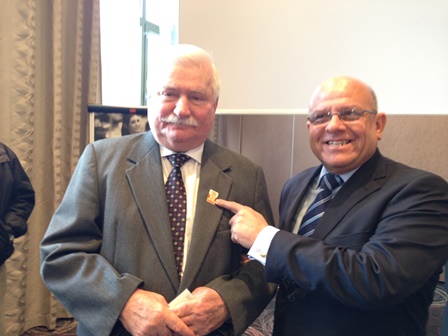
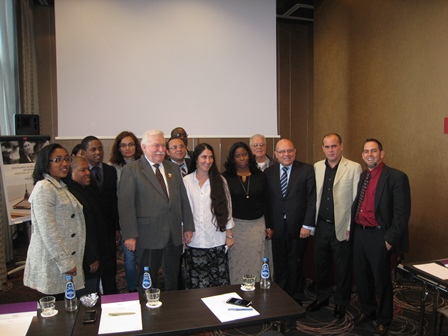
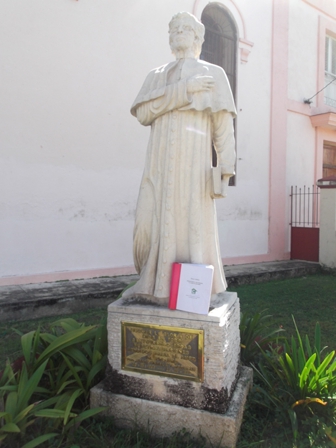 I remember every November 20th for a special reason (besides being the birthday of a dear aunt, and of a friend): on this day the Cuban nation gave birth to one of the preeminent pillars of our founding history, Father Felix Varela.
I remember every November 20th for a special reason (besides being the birthday of a dear aunt, and of a friend): on this day the Cuban nation gave birth to one of the preeminent pillars of our founding history, Father Felix Varela.